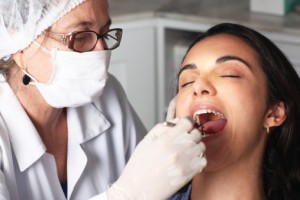 Ever heard the phrase, “you’ve gotta be cruel to be kind?” It has never been truer than when referring to gum disease treatments. Periodontal disease affects as much as 80% of US adults, but the way dental practitioners handle periodontal treatments may be part of the problem. Patients avoid periodontal treatment due to lack of treatment urgency, not fully understanding necessary treatments, and money. Many dentists hesitate to fully explain and recommend periodontal therapy because they fear patients will simply cancel appointments due to the added cost. Instead, dentists tend to try the “nice” approach – recommending periodontal appointments every three months but billing them as regular dental cleanings during six month checkups. However, by changing the focus of periodontal disease treatment to communicating clearly, emphasizing assessment and prevention, and working with patients to maximize insurance benefits, dentists can better equip patients to receive the dental care they need.
Ever heard the phrase, “you’ve gotta be cruel to be kind?” It has never been truer than when referring to gum disease treatments. Periodontal disease affects as much as 80% of US adults, but the way dental practitioners handle periodontal treatments may be part of the problem. Patients avoid periodontal treatment due to lack of treatment urgency, not fully understanding necessary treatments, and money. Many dentists hesitate to fully explain and recommend periodontal therapy because they fear patients will simply cancel appointments due to the added cost. Instead, dentists tend to try the “nice” approach – recommending periodontal appointments every three months but billing them as regular dental cleanings during six month checkups. However, by changing the focus of periodontal disease treatment to communicating clearly, emphasizing assessment and prevention, and working with patients to maximize insurance benefits, dentists can better equip patients to receive the dental care they need.
Continue reading Do Nice Dentists Finish Last? – Do Dentists Have to be Cruel to be Kind?
Tag: dental health
Eat for Your Best Oral Health
 Did you know that the month of March is National Nutrition Month as designated by The Academy of Nutrition and Dietetics? Everyone knows that diet and nutrition are critical to general health. The fact of the matter is, however, your oral health is equally dependent on and affected by nutrition. Of course there are foods to limit for the sake of your oral health, like those that are loaded with sugar or highly acidic. But there are also foods, specifically certain fruits and vegetables, which are good for your teeth and gums. And with National Nutrition Month upon us, this seems like the time to offer worthwhile tips for your oral health.
Did you know that the month of March is National Nutrition Month as designated by The Academy of Nutrition and Dietetics? Everyone knows that diet and nutrition are critical to general health. The fact of the matter is, however, your oral health is equally dependent on and affected by nutrition. Of course there are foods to limit for the sake of your oral health, like those that are loaded with sugar or highly acidic. But there are also foods, specifically certain fruits and vegetables, which are good for your teeth and gums. And with National Nutrition Month upon us, this seems like the time to offer worthwhile tips for your oral health.
Citrus Fruits
Citrus fruits, such as oranges, pineapples and tomatoes, are chock full of vitamin C, which is critical for the health of your gums. Without enough vitamin C, gums might become unhealthy and even bleed, an early sign of gum disease. Eventually, unhealthy gums may lead to tooth loss, so be sure to include lots of fresh citrus fruits for healthy gums and stable teeth.
Fiber Rich Fruits
When you chew fruits that are high in fiber, salivation increases to help wash away food debris and bacteria that can be harmful to teeth and gums. Some of these fresh fruits are apples, oranges, pears, and watermelons. This increase in saliva reduces the acid level in your mouth and helps avert dry mouth, which makes teeth more vulnerable to decay. In addition, as you chew fiber-rich fruits, you’re also massaging your gums.
Hard Vegetables Build Strong Teeth
Eating hard and fibrous vegetables, such as carrots and celery, provide your body with a good source of beta carotene. Your body needs beta carotene to make vitamin A, which is a nutrient that is vital to building strong teeth. These and other hard vegetables also massage your gums as you chew. And the water content in these vegetables cleans your teeth and gums.
Onions
Onions are great for your oral health, because they contain antibacterial sulfur compounds. These antibacterial compounds help kill the bacteria that can lead to tooth decay and gum disease. And, of course, they are strongest when eaten fresh and uncooked, so be sure to brush your teeth or rinse with a refreshing mouthwash after boosting your oral health with onions!
So, here’s to your health… your oral health!
Understanding Bruxism & TMJ Disorder: Find Relief from Nighttime Teeth Grinding
 Do you often awaken in the morning to find that your jaw is sore or that your neck and shoulders feel tense? Perhaps you suffer from frequent headaches that tend to begin in the area surrounding your temples. These symptoms are common in individuals with nighttime teeth grinding and daily jaw clenching, or bruxism and temporomandibular joint disorder (TMD). Fortunately, treatment for these orofacial issues is typically non-invasive, affordable, and easily accessible at your dentist’s office.
Do you often awaken in the morning to find that your jaw is sore or that your neck and shoulders feel tense? Perhaps you suffer from frequent headaches that tend to begin in the area surrounding your temples. These symptoms are common in individuals with nighttime teeth grinding and daily jaw clenching, or bruxism and temporomandibular joint disorder (TMD). Fortunately, treatment for these orofacial issues is typically non-invasive, affordable, and easily accessible at your dentist’s office.
What Causes Jaw Clenching and Teeth Grinding?
There are a variety of reasons that people with TMD and bruxism engage in the unconscious behavior of teeth grinding and clenching. Malocclusion, or an improper bite, is a major factor, as is daily stress. While you are sleeping, you are not able to stop the overworked muscles in the jaw and face from overtaking themselves further, leading to numerous symptoms that can affect you all day.
For many, the primary complaint related to TMJ disorder is headache pain that interferes with daily functioning. The delicate joints that connect your lower jaw to your cranium can become irritated and inflamed, causing nerve pain that can even spread to your upper back. This can lead to posture problems that further exacerbate the issue. In cases of teeth grinding, the patient is typically unaware that their jaws are placing inordinate amounts of pressure on their teeth all night. Bruxism can cause tooth fractures and enamel erosion, both of which can prove to be serious problems if not treated in a timely manner.
Bruxism & TMJ Treatment
In the majority of cases, a nighttime mouthguard is used to prevent damage to the teeth caused by clenching and grinding. This custom oral appliance fits comfortably in your mouth as you sleep, helping position the jaws properly so that the muscles aren’t unnecessarily strained. Patients who have been clenching their jaws for years are surprised to find that they experience relief from their discomfort in as few as one or two nights with their new appliance.
If you believe that you or someone in your family is suffering with the ill effects of TMJ disorder or bruxism, ask your dentist about a custom oral appliance. Relief could be a phone call away!
The Oral-Systemic Connection
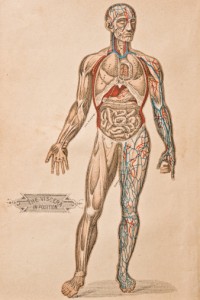 We live in an era of health consciousness, and that’s a good thing. Many people try to exercise and eat right. But being healthy is not simply a matter of what you put in your mouth, it’s also dependent on how you take care of your mouth. More and more evidence shows that there is a direct link between oral health and overall health.
We live in an era of health consciousness, and that’s a good thing. Many people try to exercise and eat right. But being healthy is not simply a matter of what you put in your mouth, it’s also dependent on how you take care of your mouth. More and more evidence shows that there is a direct link between oral health and overall health.
The oral-systemic connection characterizes the link between diseases and conditions in the mouth and health problems throughout the body. For example, periodontal or gum disease—called gingivitis in its early stages and periodontitis later—is caused by bacteria that can have access to the bloodstream when gum tissue bleeds, a common symptom of gum disease. Thus, preventing or treating gum disease and other oral infections early can be critical to avoiding secondary health concerns. So, those bi-annual dental checkups are more than just a matter of clean teeth. They can mean the difference between life and death.
Medical Conditions that Start in the Mouth
While research continues, the following is a partial list of medical conditions and diseases that have already been found to have a connection to oral health:
- Heart disease
- Stroke
- Osteoporosis
- Diabetes
- Some forms of cancer
- Some autoimmune disorders
- Low birth weight in newborns
Furthermore, the importance of maintaining oral health in order to have a proper diet and nutrition cannot be understated. People who have missing teeth are often unable to eat raw fruits and vegetables and other healthy foods that require chewing. Therefore, they choose softer foods that tend to be higher in saturated fats and sugar, both of which can have detrimental effects on the body when over consumed.
The Oral-Systemic Connection and You
What can you do to keep your oral-systemic connection healthy? First of all, brush your teeth and floss twice each day. Be sure to floss well below the gum line where bacteria hide. Secondly, see your dentist at least twice each year for a checkup. With regular visits, you and your dentist will better be able to recognize changes in your oral health and fend off any conditions that could compromise your general health.
Periodontal Disease and Systemic Health: The Mouth-Body Link
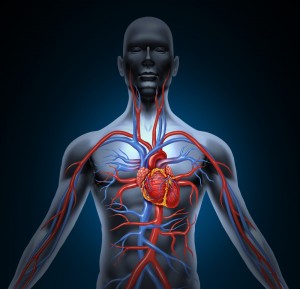 Most people know that gum disease (also known as periodontal disease) can cause major problems like bleeding gums, tenderness, and even eventual tooth loss. The more serious complications associated with this common disease, however, are not as readily recognizable. Keeping your gums free of infection can actually help you avoid a variety of other health problems now and in the future.
Most people know that gum disease (also known as periodontal disease) can cause major problems like bleeding gums, tenderness, and even eventual tooth loss. The more serious complications associated with this common disease, however, are not as readily recognizable. Keeping your gums free of infection can actually help you avoid a variety of other health problems now and in the future.
Oral Health and Your Future
When your gums are infected, the bacteria that flourish there can easily travel through your body to other tissues and organs. Because this process takes time, you may not even realize that you are at risk until more pressing symptoms arise. Medical problems that have been linked to untreated gum disease include the following:
- Complications in pregnant women, including pre-mature birth and low birth weight infants
- Dementia in older patients
- Pancreatic cancer
- High blood pressure
- Heart attack
- Stroke
- Rheumatoid arthritis and other bone/joint problems
- Complications in the treatment of diabetes
Treating periodontal disease now is one of the first lines of defense against these and other medical conditions. Your dentist can discuss with you the periodontal therapy process, providing you with all the information you need to make a decision regarding your oral health and your systemic well-being.
Healthy Gums, Healthy Body
If you have noticed the tell-tale signs of gum disease (including bleeding gums, sensitivity, redness, and a receding gum line), it is imperative that you make an appointment with your dentist as soon as possible. Early treatment of gum disease helps ensure a faster recovery, thereby reducing your risk of developing diseases and health conditions like those listed above. Call your local dentist today and take the first step toward a healthier body and a happier smile with periodontal therapy.
Five Reasons Why It’s Worthwhile to Smile
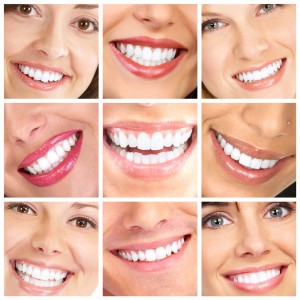 Nineteenth century novelist George Eliot once said, “Wear a smile and have friends; wear a scowl and have wrinkles.”
Nineteenth century novelist George Eliot once said, “Wear a smile and have friends; wear a scowl and have wrinkles.”
Yet smiling is more than just a way to convince your mother that you really did enjoy that meatloaf surprise. Even the smallest upward lip curve—whether or not it’s sincerely delivered—has far-reaching emotional and physical benefits.
Here are five advantages of turning that frown upside down:
1. Studies have shown that smiling lowers blood pressure. If you need some instant Zen, then all you have to do is smile. Chanting is optional (especially if you’re standing in line at the grocery store). Continue reading Five Reasons Why It’s Worthwhile to Smile
April Is National Cancer Control Month!
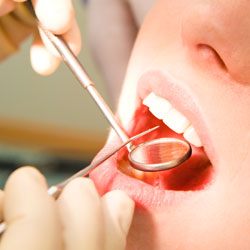 Why are we discussing cancer on a dental newsletter? Because dental health affects your overall health, and your smile is your dentist’s business. Oral Cancer is a little discussed cancer that is on the rise, despite the overall decline in cancer rates. Why? Awareness. Many people simply don’t talk about oral cancer. Your dentist wants to change that.
Why are we discussing cancer on a dental newsletter? Because dental health affects your overall health, and your smile is your dentist’s business. Oral Cancer is a little discussed cancer that is on the rise, despite the overall decline in cancer rates. Why? Awareness. Many people simply don’t talk about oral cancer. Your dentist wants to change that.
Every year, almost 30,000 Americans are diagnosed with oral cancer. Of these cases, 70% are discovered in the disease’s later stages. As many as one fourth of those diagnosed didn’t even participate in the risky behaviors commonly attributed to the disease, such a tobacco use or excessive alcohol consumption.
5 Tips for Tip-Top Teeth
 Dental caries (cavities) is the most prevalent childhood disease, and 90% of adults have had a cavity. Gum disease is responsible for 70% of adult tooth loss. A few simple habits could help you reduce your risk for cavities and gum disease – and improve your potential for keeping natural teeth long into your golden years. Kids and adults alike can benefit from these 5 quick and easy oral health tips. Some you’ve known since kindergarten, while others may be news. Continue reading 5 Tips for Tip-Top Teeth
Dental caries (cavities) is the most prevalent childhood disease, and 90% of adults have had a cavity. Gum disease is responsible for 70% of adult tooth loss. A few simple habits could help you reduce your risk for cavities and gum disease – and improve your potential for keeping natural teeth long into your golden years. Kids and adults alike can benefit from these 5 quick and easy oral health tips. Some you’ve known since kindergarten, while others may be news. Continue reading 5 Tips for Tip-Top Teeth
10 Tips for Choosing a Great Dentist
Whether you’re a busy parent, an image-conscious executive, or a senior citizen with special needs, finding a good dentist can be a struggle. Where do you start? You could open the phone book or Google dentists in your city. But then what?
Here are 10 tips to help you make an informed and wise decision. And remember, you’re going to trust your new dentist with your health and your image – and maybe your loved ones. Be smart!
Also, keep in mind that everyone has different needs, priorities, and personalities. For instance, if you want a good family dentist, and you aren’t planning on getting veneers anytime soon, you’ll want to find a general dentist who’s good with kids – not an adult cosmetic dentist. Continue reading 10 Tips for Choosing a Great Dentist